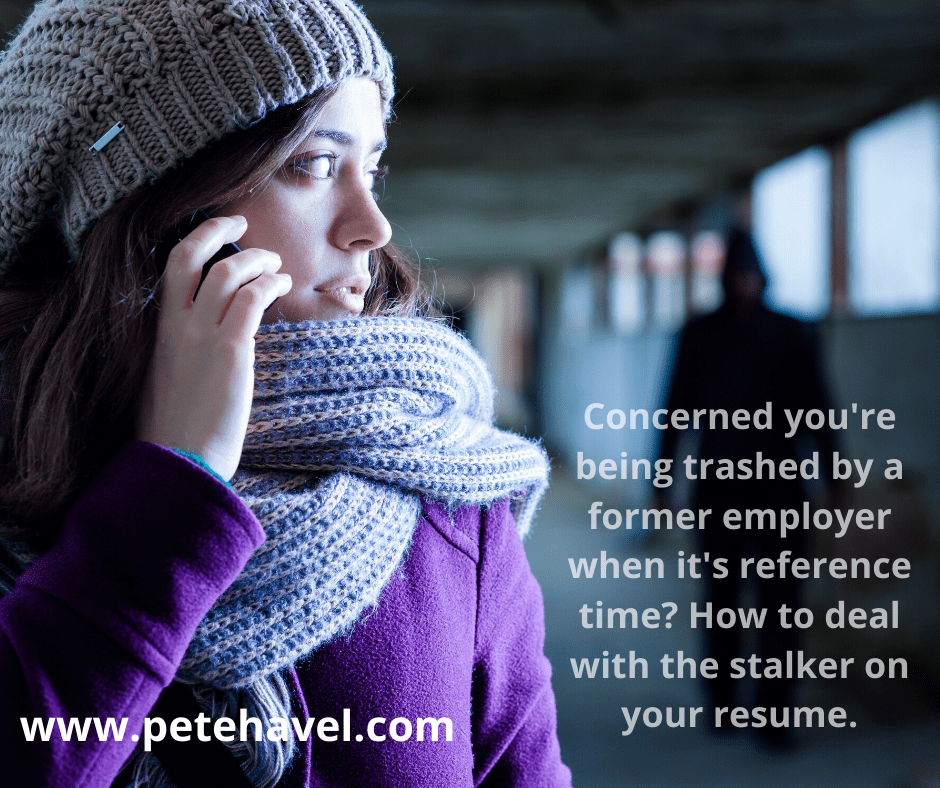How do you stop bad references from hurting your career?
Do you have a stalker on your resume? That person, or that organization, lurking in the shadows ready to attack dishonestly and even illegally when you are in a job hunt? If you screwed up and the truth hurts, then you own it unfortunately…or maybe it’s a lesson and scar you’ll have to endure for a while. But what if you’re being attacked for app the wrong reasons? I want to show you some ways to reduce the potential damage and maybe sleep a little easier knowing you’ve done everything you can to protect yourself.
Trust me, I understand. I write in my book, The Arsonist in the Office, about the surreal experience of being threatened by the leader of the HR department with legal fees that he said would bury me financially…after he fired me for speaking up with concern about shocking, nauseatingly bad behavior my family and I had faced from a coworker within the organization.
I wondered–What would that employer do when it came to reference checks? What were they saying about me to people in the industry? How many lines were they willing to cross to cover up their bad behavior? Would they sabotage my outreach to potential business partners? And, as is often a part of human nature, to what extent will people act to demonize you to make them feel better about the actions they took? Since the organization was on my resume, I feared what this ‘stalker’ might do and say. Not only because of the power of negative words coming from an ‘official’ source, but also because it’s taboo in an interview to say anything negative about an employer–especially when you won’t even be in the room or on a call when reference checks are made. You begin to walk defensively into every situation…it’s the antithesis of a winning strategy.
You’ll be amazed at what bad seeds–or good people with a capability to do bad things–will do when they back themselves into a corner to protect themselves.
I thought about it every day for a long time, but when I decided to write a book that helps other people survive against bad behavior in the workplace, that changed my perspectives. I let it shake me up–and then I decided to never play only defense again.
When your career is on the line, it’s important to play a smart, well-controlled offensive strategy that you control–not just react to.
No one wins many competitions by playing ‘not to lose’. You’ve got to play to win–but win with dignity. And just as importantly, don’t let your confidence be killed in your job search by wondering who and what’s lurking out there.
Ideally, a phone call with that person or a company representative can take care of the issue because good people can often put aside their differences. But not everyone is wired the same way to want to find resolution.
Here are some strategies and perspectives that will help you avoid the shadows where your career stalker might be.
- Find someone else inside the problematic employer to be your reference. Most reference checks don’t get overly aggressive–often to the detriment of the organization, but sometimes to the benefit of the candidate. Knowing that, have a person you can trust be your reference when the prospective employer calls. Keep in contact with this ‘friendly’ or develop more than one, as you may them for the rest of your career.
- If you leave a job under circumstance that might embarrass the organization, you have leverage. Use some of that leverage to try and get a letter from that former employer. It can be a trade off for other benefits or away to signal your interest in not having mutually assured destruction in a legal or other public forum. Someone inside that organization may see the benefit of a clean break at that point. Find out. If you can get it, you can avoid these problems forever.
- Talk to an attorney about your issue, as a targeted call to a legal department can often take care of an issue like this.
- Be forceful and responsible if the stalker lashes out–whether it’s in a reference call, an insult on social media, or you simply hear of badmouthing of you by representatives of the organization, do NOT act as though that fire will simply go out. It’s amazing how quickly gossip can spread and how often salacious gossip is believed simply because it fills a void. Cease and desist orders written by licensed, reputable attorneys do not have to be expensive and they’re an excellent way to find out if you’re dealing with the entire organization or a rogue employee. On anything beyond a moderately priced cease and desist order, think about how far you’re willing to protect your reputation very seriously…and that usually comes down to money and being willing to go to court if necessary. However, in most (not all) cases, a legal department will direct a stalker to stop their actions. Cease and desists may take care of the problem in many cases as it brings things to light in an actionable setting that puts parties on notice of the potential for legal fees and a messy discovery process.
- Keep evidence. If you have screenshots, emails, or other information that shows someone is libeling or defaming you, hang onto it. You may need it. It is important to understand that you likely won’t have a strong legal case if an employer representative is speaking negatively but truthfully about you on all matters.
- Check ALL of your references–it’s the smart thing to do. As you’re thinking about your references, don’t think of them as a static list that never changes. Talk to each of your references at least once a year and walk through what they might say about you. Do you have anyone on your list who might mean well, but is clumsy and negative in how they talk about people? They might not be your best option.
- If you aren’t sure if you have a problem with your references, but wonder what is being said about you and you’re not sure if someone will tell you, spend the money to go to a pro and find out. There are reference check services who will call your references and ask all the right questions to find out what they will say about you. It’s a small investment, but it’s a quick and easy way to learn if you have a problem.
No one can afford–literally and figuratively–to go into job search mode wondering who or what is around the next corner. If you’ve got a problem, deal with it.
And if you need help protecting your career and your interests in bad professional situations, check out my book, The Arsonist in the Office. It’s available at http://www.arsonistintheoffice.com and on Amazon (audiobook, paperback, and e-book)
Disclaimer: These tactics won’t deal with every problem, but should cover most.
Have you experienced problems with an employer going rogue? How did you deal with it? Let me know what you think.
Pete Havel is a speaker, trainer, and consultant on workplace culture and leadership. He speaks and consults for organizations ranging from law enforcement agencies to Fortune 500 companies. He’s also the author of “The Arsonist in the Office: Fireproofing Your Life Against Toxic Coworkers, Bosses, Employees, and Cultures,” named as a #1 Hot New Release by Amazon. It’s available at www.arsonistintheoffice.com Pete can be reached at pete@petehavel.com and 214-244-7906. You’ll also find more information on him at www.petehavel.com.
Error: Contact form not found.







